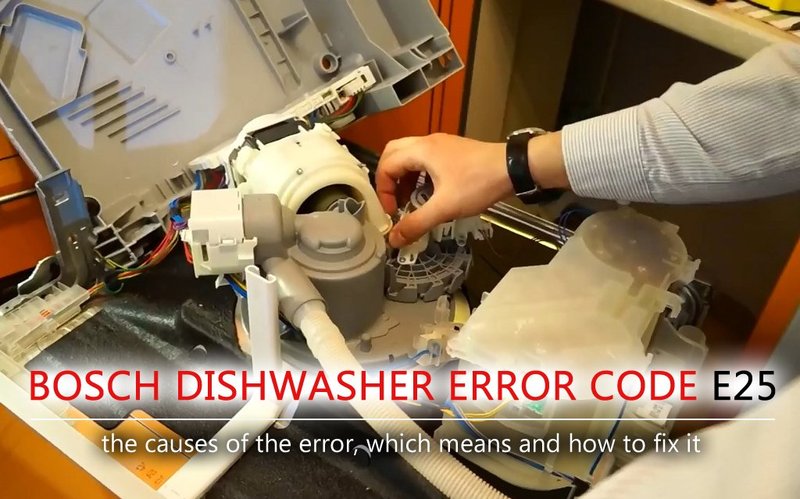
Code LE generally indicates a problem with your Bosch dishwasher’s water level sensor. Think of it as your dishwasher’s way of saying, “Hey, something’s not quite right with the water levels in here!” This could mean water is not filling properly, or perhaps the sensor is faulty. While it might be tempting to ignore this flashing beacon and hope for the best, just like a blinking check engine light in your car, it’s often best to take action to prevent further issues.
Understanding Bosch Dishwasher Error Code LE
The error code LE in a Bosch dishwasher stands for a leak in the water system. Now, don’t let the technical jargon intimidate you. Think of it as your dishwasher’s leaks or blockage alarm system. Just like how a smoke alarm goes off to alert you of potential danger, this code warns you of water leaks or irregularities, allowing you to take the necessary precautions.
So, why does this happen? There are a few possible reasons. It could be due to a blocked drain hose, meaning water isn’t exiting the machine as it should, similar to how a clogged sink backs up. Another possibility is a faulty water inlet valve or a defective sensor. Sometimes, even improperly loaded dishes can cause this error by obstructing the spray arms, much like a rock stuck in your shoe making it hard to walk.
Ignoring this code might lead to more serious issues down the line, such as water damage to your kitchen or more expensive repairs if components break. Therefore, it’s important to tackle this error head-on. Start by checking the drain hose for blockages or kinks. If the hose is clear and the error persists, moving on to inspect and possibly replace the water inlet valve and sensor might be necessary.
Steps to Troubleshoot Error Code LE
First things first, safety is key. Always disconnect your dishwasher from its power source before attempting any DIY fixes. It’s like turning off your car before changing the oil; you wouldn’t want anything unexpected happening while you’re mid-fix.
Now let’s get into the nitty-gritty. Begin by examining the dishwasher’s drain hose. This hose is responsible for carrying dirty water out of the machine. Over time, debris can build up, causing blockages. Imagine trying to sip through a straw that’s been crumpled — not much is going to get through. Carefully check for any bends or obstructions and straighten them out if necessary.
Next, take a look at the water inlet valve. This valve is like the kitchen faucet to your dishwasher, allowing water to flow in. If it’s not functioning properly, your dishwasher won’t get the correct amount of water. Removing and cleaning it with a bit of vinegar can sometimes dislodge any hard water residue that might be causing problems. If cleaning doesn’t do the trick, replacement is often a straightforward fix.
When to Call a Professional
Sometimes, despite your best efforts, that persistent LE code just won’t budge. In cases like these, calling a professional is your best bet. It’s similar to when your car has a problem just beyond your toolbox — sometimes it’s best to leave it to those with the right expertise and tools.
Professional technicians can perform more advanced diagnostics and repairs, identifying issues that might not be obvious to the untrained eye. They have access to specialized tools and replacement parts that can make short work of even the most stubborn problems. Plus, they can ensure that any repairs are up to the Bosch standard, maintaining the efficiency and longevity of your appliance.
Before scheduling a service call, gather some information to help the technician understand the problem better. Take note of when the LE code appears, any sounds or leaks you’ve noticed, and any DIY steps you’ve already tried. This will help them diagnose the problem faster and more effectively.
Preventative Measures for Future Peace of Mind
Once you’ve resolved the existing issue, it’s crucial to take steps to prevent a recurrence. Regular maintenance and mindful usage are key here, much like regular oil changes keep your car running smoothly. Start by ensuring that the dishwasher is always loaded correctly. Avoid overloading, and make sure that nothing is blocking the spray arms. Treat your dishwasher like a well-organized library where everything has its place, ensuring smooth operation.
Routine cleaning can also make a world of difference. Running an empty cycle with a dishwasher cleaner can help remove any lingering food particles and mineral build-up that might contribute to future clogs and errors. Additionally, check hoses and connections periodically for wear and tear, like you would inspect a garden hose for leaks during spring cleaning.
Investing a little time in these preventative measures can keep your dishwasher running smoothly, reducing the likelihood of seeing that pesky LE code again. Through a combination of mindfulness and maintenance, you can ensure your Bosch dishwasher continues to serve you efficiently for years to come. And remember, when in doubt, don’t hesitate to call a professional — your kitchen, and your peace of mind, are worth it.